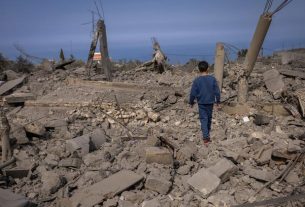The environmental impact of climate change – shifting weather patterns or vanishing biodiversity – is widely recognised. But do we truly understand the toll rising temperatures are taking on human health?
Members of the Climate-Health Cluster, an EU-funded network of European researchers, do not think so. Their mission is to measure these health risks and develop strategies to protect people as the planet warms.
To do this, they are creating protocols to safeguard vulnerable people during extreme heatwaves and offering recommendations to make health systems more responsive to the evolving threats posed by climate change.
Why focus on health?
A major part of their work is finding effective ways to communicate these risks. According to Professor Cathryn Tonne, an environmental epidemiologist at the Barcelona Institute for Global Health, many people remain indifferent to the global climate crisis.
“Concepts like net zero, rising sea levels, or melting ice caps can feel distant and abstract. To make these issues more relatable and urgent, we need to highlight their importance for health,” said Tonne, who coordinates CATALYSE, a five-year EU-funded research initiative running until September 2027.
“There are serious health implications to climate change, but we have not been very effective at explaining these to the public, nor the health benefits of climate action.”
Clear and consistent messages
“
There are serious health implications to climate change, but we have not been very effective at explaining these to the public.
CATALYSE, one of a cluster of six EU-funded research projects on climate and health, brings together a team of researchers from 10 EU countries, plus Switzerland and the UK. One of the areas they study is how the impacts of climate change are communicated to the public.
Tonne pointed out that climate messaging has shifted over time, creating confusion.
“Wood heating was once promoted as a climate-friendly option, only for later evidence to reveal its negative impact on air quality,” she said. Similarly, a shift from gasoline to diesel vehicles was initially seen as a good thing for the climate, until the air pollution data emerged.
Climate change as a health issue
Tonne believes that reframing climate change as a health issue is key to mobilising both people and policymakers.
“We believe this would ultimately lead to more policy engagement, ideally with EU countries speeding up the implementation of EU climate policies.”
The underlying idea is simple. The more people realise climate change endangers lives, the more they may be willing to take action, which would ultimately benefit both the environment and health. But it is not always straightforward.
For example, the CATALYSE team is looking at the environmental benefits of bicycles and feels that the health aspect is not highlighted enough.
“We have a legally binding net zero target, but we need to ask which strategies are likely to deliver the most health benefits,” said Tonne. “Is it through clean energy generation, electric vehicles powered by renewable electricity, or – as we think – getting people out of cars and onto their bikes?”
Heat stress and warning programmes
Heat stress is another growing concern, particularly in Mediterranean countries. Europe saw more than 61 000 deaths in the summer of 2022 and over 47 000 in 2023, according to official estimates and peer-reviewed studies.
Globally, the World Health Organization estimates that climate change will cause at least 250 000 additional deaths per year between 2030 and 2050.
To tackle this, the researchers are gathering data and working with meteorological agencies to develop early warning systems. The aim is to send personalised warnings to vulnerable groups, such as older women, advising them to stay indoors or take extra precautions on days when they are at high risk.
Outdoor workers at risk
Another group of concern is outdoor workers. In Europe, between 800 000 and 1 million seasonal outdoor workers are hired each year, mainly in agriculture, which puts them at a growing risk of heat-related illness. In most cases, these are migrant workers.
Over the past three years, CATALYSE researchers have collaborated with NGOs from Spain, Italy and Austria to gather data during peak summer months. Their goal was to better understand the extent of the extreme heat exposure risk among outdoor workers and develop recommendations to protect them.
“The working and living conditions of these workers are often appalling, and extreme heat is making it so much worse,” said Tonne.
Life in the “orchard of Europe”
“
We need to raise awareness […] about how migrant workers live and how conditions need to improve.
Daniel Izuzquiza, the director of SJM-Jesuit Migrant Service, an NGO collaborating with CATALYSE, shared insights from Spain’s Almeria region, dubbed the “orchard of Europe”.
“It’s a very hot region in the summer and people work under stressful conditions, compounded by poor housing,” he said. “Many live in shacks or shanty houses with little ventilation, meaning they endure dangerously high temperatures day and night.”
Few structural measures address this reality, and those that do exist, such as whitewashing greenhouses, seem to be more targeted at the wellbeing of crops than people, according to Izuzquiza.
Perhaps the most alarming finding is how normalised these conditions have become. “People need access to drinking water and better housing. We need to raise awareness among employers, workers and consumers about how migrant workers live and how conditions need to improve.”
Making climate-health links visible
For Tonne and her colleagues, the challenge is not just scientific, but communicative: making the link between climate and health visible, urgent and actionable.
That means crafting clear, consistent messages and reframing climate action as an investment in wellbeing, not just an environmental necessity.
“The more people understand that climate change endangers lives, the more likely they are to support policies that protect both the planet and public health,” said Tonne.
By recognising these connections, Europe can ensure that, as we work to protect the environment, we also safeguard the health and wellbeing of everyone.
Research in this article was funded by the EU’s Horizon Programme. The views of the interviewees don’t necessarily reflect those of the European Commission. If you liked this article, please consider sharing it on social media.



